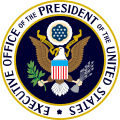This article needs additional citations for verification .(November 2025) |
The White House Director of Legislative Affairs, officially the Assistant to the President and Director of the Office of Legislative Affairs, is part of the senior staff of the president of the United States. The officeholder is responsible for developing and promoting the legislative agenda of the president and coordinating with members of both houses of Congress.
The legislative director, who is appointed by and serves at the pleasure of the president, without the need for United States Senate confirmation, is usually given an office in the West Wing of the White House.



















